Your tax dollars at work! It’s the 70TH ANNIVERSARY of the ludicrous — but extremely damaging — congressional comic book hearings…
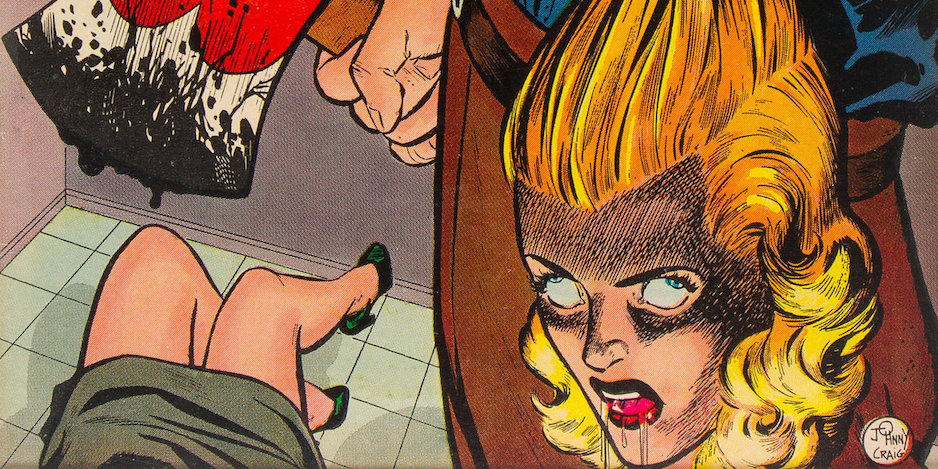
By FRED VAN LENTE
Wednesday, April 21, 1954, was one of the more bizarre days in comics history. The United States Senate Judiciary Committee’s Subcommittee on Juvenile Delinquency met not in Washington, but in the federal courthouse at Manhattan’s Foley Square, to be closer to the subject of that day’s hearings: the comic book industry, which child psychiatrist Dr. Fredric Wertham (among others) accused of, at best, being harmful to kids’ psyches; and, at worst, inspiring copycat crimes among minors. The committee was investigating the alleged link between the two.
Said investigation wasn’t exactly unbiased. There was an unethically high degree of cooperation between the committee’s director and Wertham himself. In a non-coincidence, Wertham’s much-anticipated expose on the evils of comics, Seduction of the Innocent, was published Monday, April 19, two days before, and the publicity surrounding the hearings no doubt helped catapult the doctor’s screed to bestseller status.
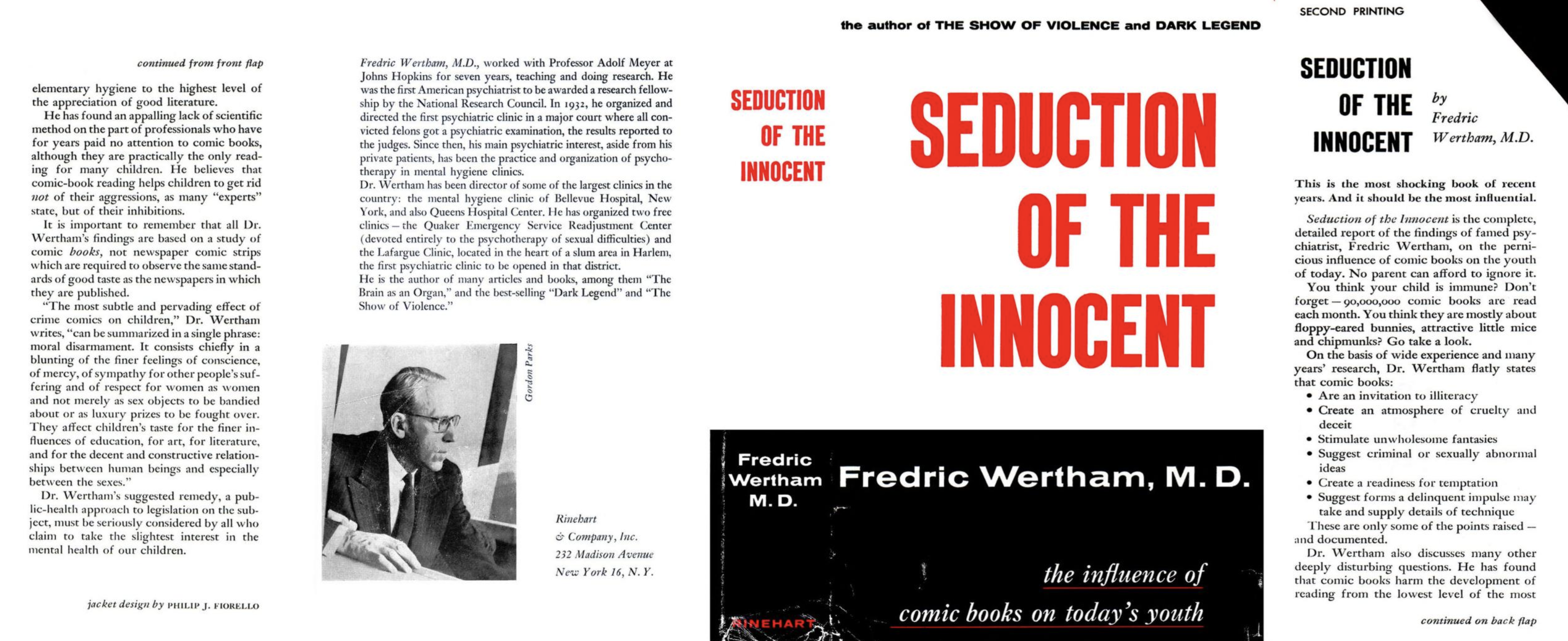
Wertham was the Senate’s star witness on April 21, but he wasn’t the only one. William M. “Bill” Gaines, brash young publisher of EC Comics, was the only actual maker of comic books who volunteered to testify in the industry’s defense. His much-attacked crime, horror, and, strangely, parody comics weren’t the only such titles on the stands, but they were the best in their respective genres, and the most popular; Gaines had the most to lose from the hearing.
And, in fact, he lost almost everything. Here are the TOP 13 MOST INFAMOUS EC COMICS, according to the twin assault that was Seduction and Senate hearing:
—
13. “Are You a Red Dupe?” House Ad, Tales from the Crypt #43. Not to blame the victim, here, but Bill Gaines brought a fair share of his troubles on himself. A few days after the Subcommittee on Juvenile Delinquency announced hearings into the comics industry (just as they were also holding hearings on guns, gangs, drugs, and many other alleged causes of “juvies”), Gaines had Jack Davis draw up this satirical ad saying the only people who really want to ban comics are Communists.
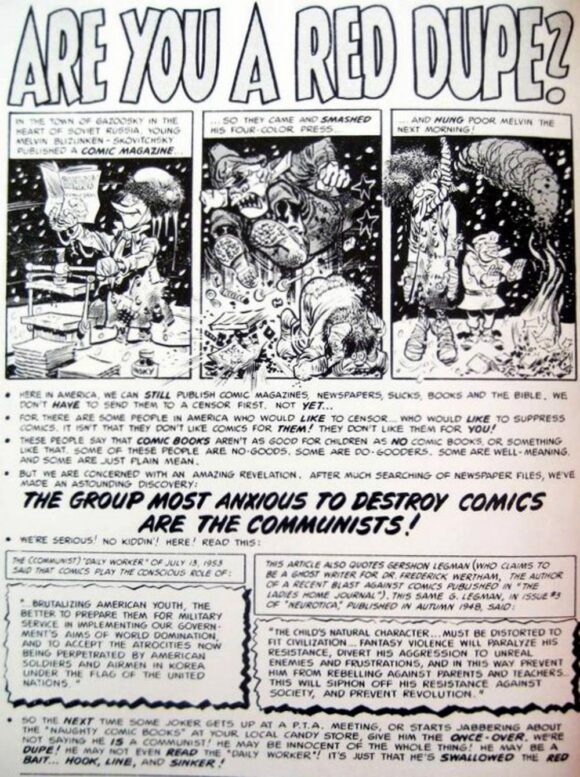
Now, he could have just run this ad in his comics, but nooooooo, without the knowledge of his editorial partner, Al Feldstein, he actually sent it to the office of committee chair Robert C. Hendrickson (R-NJ). Hendrickson brought the ad to the Senate floor on April 9 to officially denounce Gaines’ attempts to intimidate him. Your tax dollars at work.
Accusing senators of being Commies while the Army-McCarthy hearings were literally going on at the same time practically guaranteed Gaines a hostile audience when he showed up to testify. The committee certainly had plenty of gory EC Comics covers on hand to publicly embarrass him, and members had zero interest in anything the publisher had to say.
Even Gaines himself would later admit, “it was one of my dumber things.”
—
12. Cover, Panic #2. According to the National Archives’ excellent educational unit on the Senate comics hearings, this cover wound up on the subcommittee’s evidence list. Considering the look of nihilistic glee on the kid’s face, brilliantly rendered by series editor/creator Al Feldstein, is it any surprise it freaked out straight-laced senators? Your tax dollars at work!
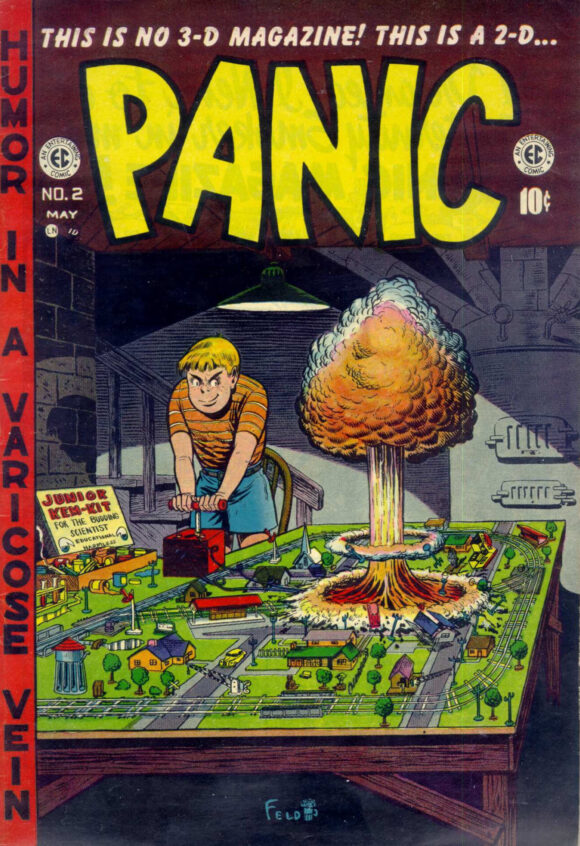
—
11. “Right on the Button,” Weird Science #19. The centerpiece, literally, of Seduction of the Innocent are the illustrations in the middle, depicting various objectionable comics images along with Wertham’s snide commentary. Here you find the climax of this Gaines/Feldstein/Elder joint, which Wertham sums up shockingly accurately as, “A young girl on her wedding night stabs her sleeping husband to death with a hatpin when she realizes that he comes from a distant planet and is a ‘mammal.’”
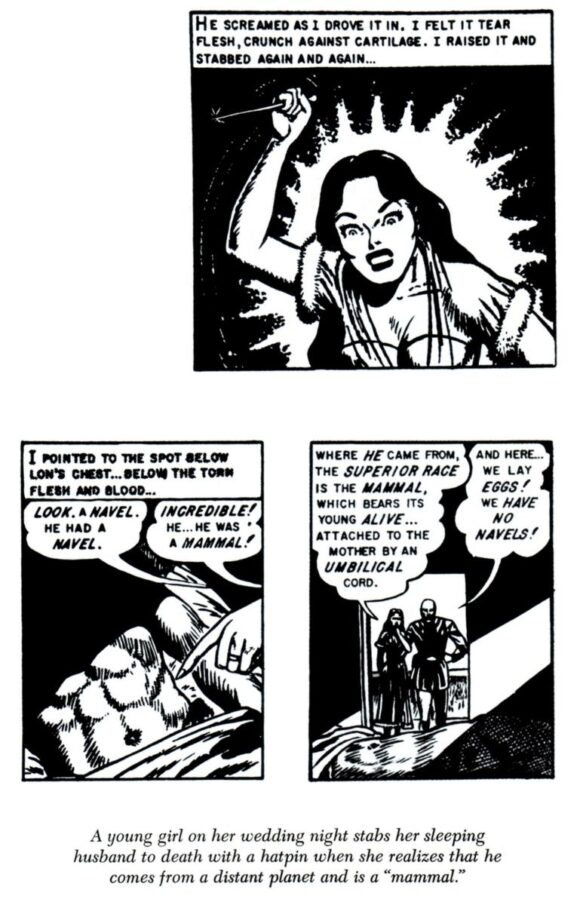
As if this is a bad thing. How many genocides have been committed by non-mammals, I ask you?! (The new bride in question is the Martian member of an egg-laying, and, apparently, really xenophobic species.)
—
10. “The Night Before Christmas,” Panic #1
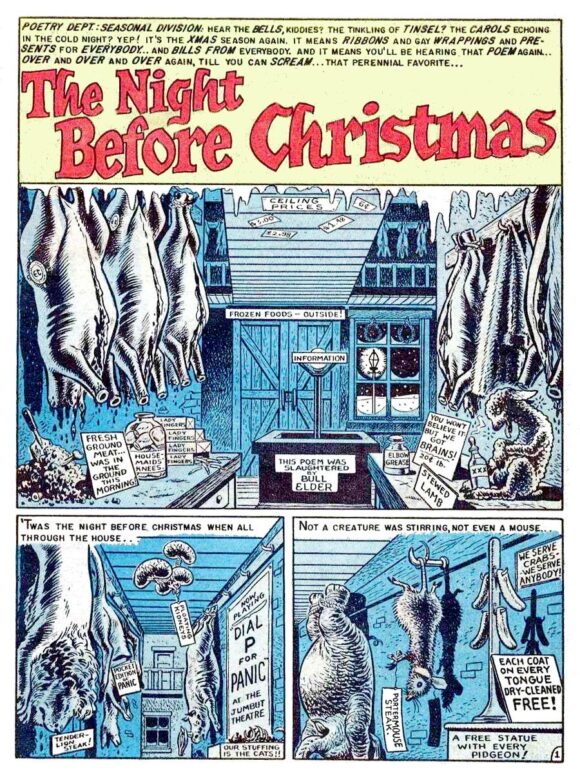
Senator KEFAUVER. You did get one magazine banned by the attorney general of Massachusetts, did you not?
Mr. GAINES. The attorney general of Massachusetts reneged and claims he has not banned it. I still don’t know what the story was.
Senator KEFAUVER. Anyway, he said he was going to prosecute you if you sent that magazine over there any more.
Mr. GAINES. He thereafter, I understand, said ─ he never said he would prosecute.
Senator KEFAUVER. That is the word you got though, that he was going to prosecute you?
Mr. GAINES. Yes.
Senator KEFAUVER. When was that?
Mr. GAINES. Just before Christmas.
Senator KEFAUVER. Which magazine was that?
Mr. GAINES. That was for Panic No. 1.
Gaines’ serious troubles began in 1953, as soon as Bill Elder slapped a “Just Divorced!” sign on the back of Santa’s sleigh in the inaugural issue of this Mad copycat. Santa Claus is really Saint Nicholas, see, and saints can’t get divorced, see? The Governor’s Council of Massachusetts freaked out and demanded that the state ban the comic, a fact soon-to-be failed vice-presidential candidate Sen. Estes Kefauver (D-TN) remembered a few months later. Your tax dollars at work!
—
9. Cover, Crime SuspenStories #20. “Cover of a children’s comic book,” sniffs the accompanying caption for the cropped version of Johnny Craig’s cover in Seduction of the Innocent.
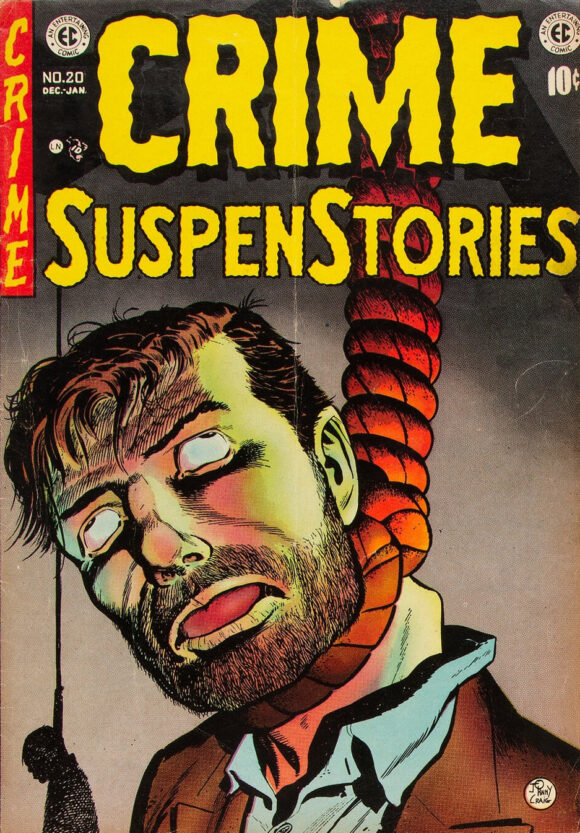
Despite the love lavished on EC by adult fans then and now, Gaines repeatedly asserts during his Senate testimony that his extremely gory, violent, sexy comics are fully intended for children, a stance you don’t have to be Fredric Wertham to raise an eyebrow at. Even today Gaines would have been torn apart in the media, social or otherwise, for that position.
—
8. Cover, Vault of Horror #30
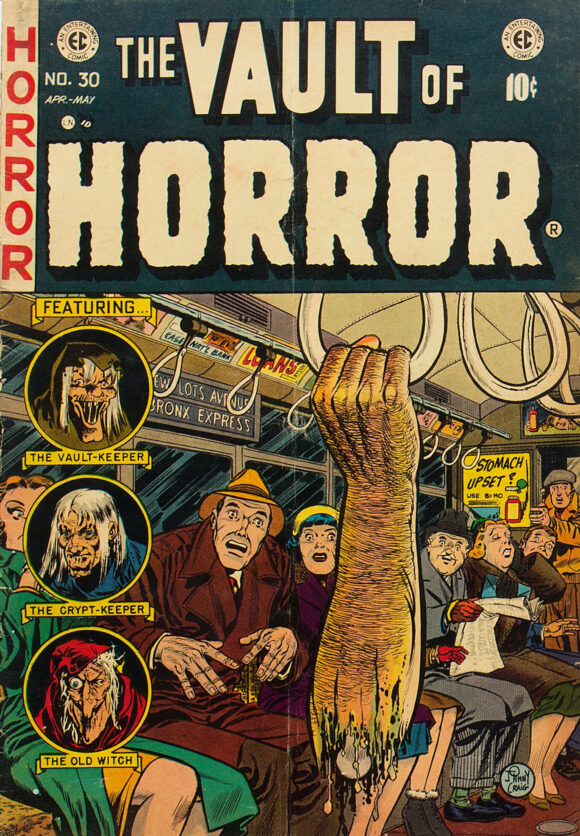
Senator KEFAUVER. Mr. Gaines, I had heard that your father really did not have horror and crime comics. When he had the business he printed things that were really funny, and stories of the Bible, but you are the one that started out this crime and horror business.
Mr. GAINES. I did not start crime; I started horror.
Senator KEFAUVER. Who started crime?
Mr. GAINES. I really don’t know.
Senator KEFAUVER. Anyway, you are the one who, after you took over your father’s business in 1947, you started this sort of thing here. This is the May edition of Horror.
Gaines tried to have his cake and eat it too in his testimony by draping himself in the banner of his late father Maxwell C. Gaines, founder of E(ducational) Comics, publisher of such wholesome fare as Picture Stories from the Bible before Bill took over; but as you can see, the senators weren’t buying it. Your tax dollars at work! (Cover by Craig, again.)
—
7. Cover, Crime SuspenStories #23
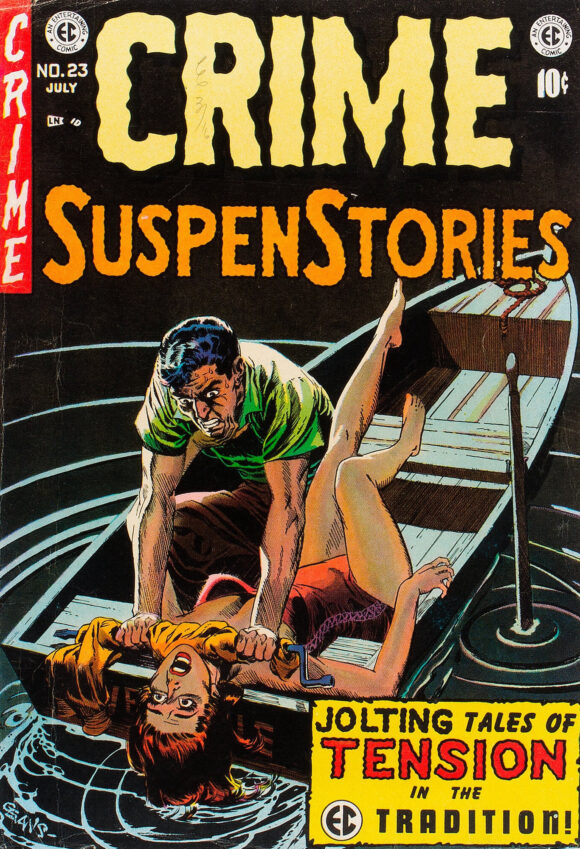
The CHAIRMAN. Here is another [cover] I want to show him.
Senator KEFAUVER. This is the July one. It seems to be a man with a woman in a boat and he is choking her to death here with a crowbar. Is that in good taste?
Mr. GAINES. I think so.
Mr. HANNOCH. How could it be worse?
Your tax dollars at work! (Cover by George Evans)
—
6. “I Dreamed I Went to a Fraternity Smoker in my Panic Magazine!” House Ad, Mad #10
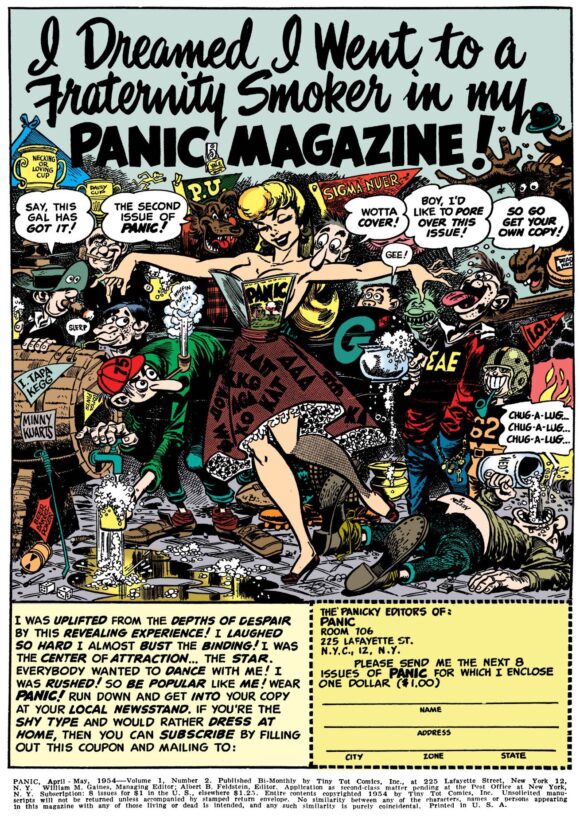
The integrity of America’s fraternity smokers must be preserved, people:
Senator KEFAUVER. Then the attraction here is “I dreamed I went to a fraternity smoker in my Panic magazine,” you have dice on the floor and cigarettes, somebody getting beer out, somebody laying on his back taking a drink, Do you think that is all right?
Mr. GAINES. This is an advertisement for one of my lampoon magazines. This is a lampoon of the Maiden-Form brassiere ad, I dreamed I went to so-and-so in my Maiden-Form brassiere, which has appeared in the last 6 years in national family magazines showing girls leaping through the air in brassieres and panties. We simply lampoon by saying “I dreamed I went to a panic smoker in my Panic magazine.”
Senator KEFAUVER. I mean, do you like to portray a fraternity smoker like that?
Mr. GAINES. This is a lampoon magazine. We make fun of things.
Your tax dollars at work!
—
5. “The Whipping,” Shock SuspenStories #14. Wertham wasn’t some prudish social conservative, as many comics fans still seem to believe; he was an overreaching consumer advocate in the Ralph Nader vein, believing he was protecting vulnerable children from exploitation by big business.
His project would be easier to respect if his tactics weren’t so incredibly cynical. Coming to the conclusion that all comics are bad and made by soulless capitalists, for him the end of the industry justifies any means. There’s no lie too bold, no insinuation too baseless for Wertham to deploy, so long as it damages comics.
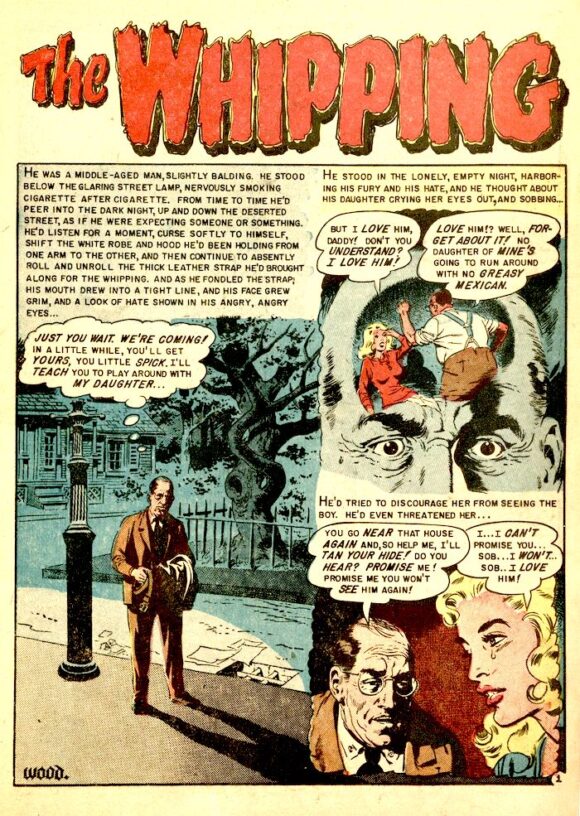
Case in point: Gaines was rightfully incensed when, in his testimony that morning, Wertham re-asserted his frequent charge this Gaines/Feldstein/Wally Wood anti-racism tale, about a Klan leader who catches his own daughter up in his prejudicial net, were teaching kids how to be bigots, rather than denouncing bigotry. In other words, that just by showing a thing you are supporting said thing.
GAINES. What are we afraid of? Are we afraid of our own children? Do we forget that they are citizens, too, and entitled to select what to read or do? We think our children are so evil, simple minded, that it takes a story of murder to set them to murder, a story of robbery to set them to robbery?
Your tax dollars at work?
—
4.) “The Secret,” Haunt of Fear #24. The senators zeroed in on EC stories involving actual children in jeopardy, like this one by scripter George Wessler and artist George Evans, which would be adapted by HBO’s Tales from the Crypt into the finale of its second season. An orphan is adopted by a vampire couple to fatten him up for the kill, only for the dracs to discover they’ve nabbed a werewolf kid by accident the hard way. The deeply confused senators grilled Gaines about whether or not this story would traumatize kids in foster care, leading to this moronic exchange:
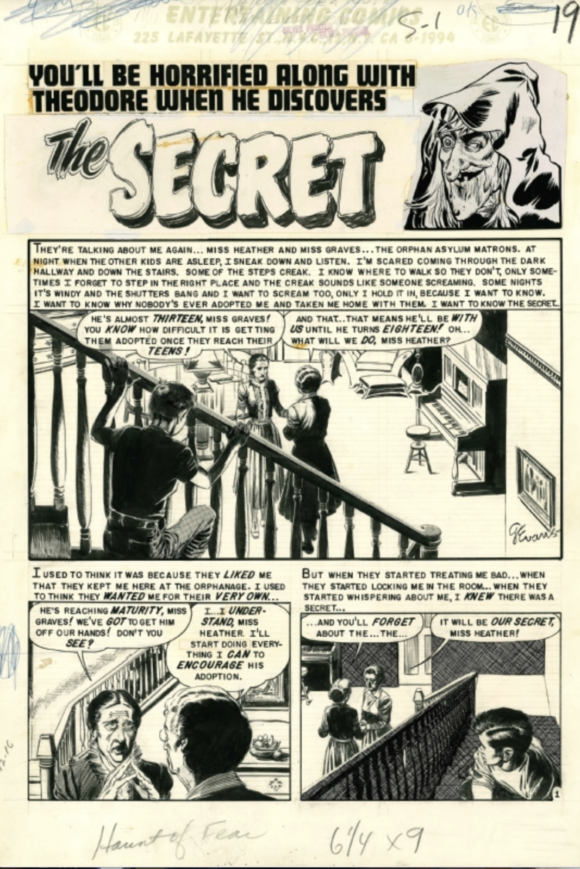
Mr. GAINES. Most foster children, I am sure, are not in homes such as were described in those stories. Those were pretty miserable homes.
Mr. HANNOCH. You mean the houses that had vampires in them, those were not nice homes?
Mr. GAINES. Yes.
Mr. HANNOCH. Do you know any place where there is any such thing?
Mr. GAINES. As vampires?
Mr. HANNOCH. Yes.
Mr. GAINES. No, sir; this is fantasy.
Was… the U.S. Senate trying to get Bill Gaines to admit he believed in vampires? Your tax dollars at work!
—
3. “The Orphan,” Shock SuspenStories #14. Senators found Lucy, the blonde waif who murders her abusive father and gets her floozy mother and her mother’s boyfriend executed for it in this Jack Kamen-drawn tale, way more disturbing than any vampire or werewolf in the EC oeuvre. It was exactly the sort of thing that could prove Wertham’s thesis of copycat juvenile delinquency: How many little girls were sitting at home right now, Shock SuspsenStories in one hand, revolver in the other, preparing to blow up the nuclear family?
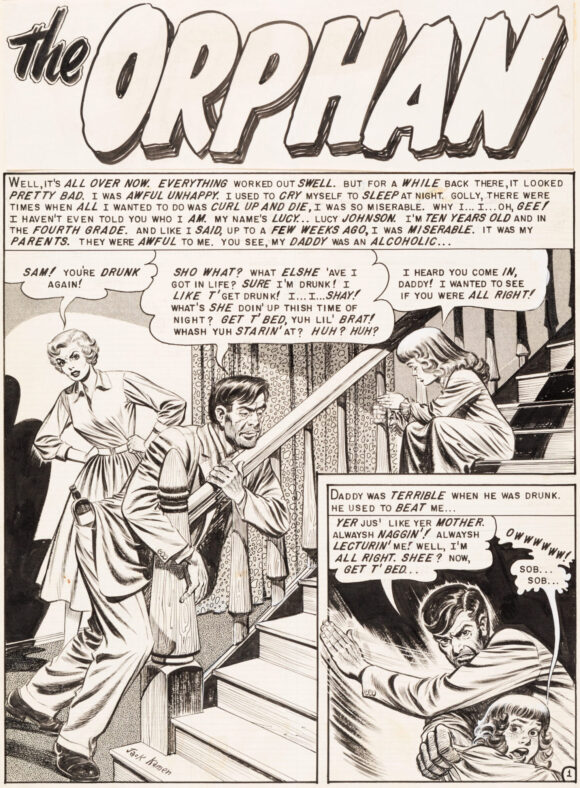
Senator HENNINGS. As a result of murder and perjury, [Lucy] emerges as triumphant?
Mr. GAINES. That is right.
Mr. HANNOCH. Is that the O. Henry finish?
Mr. GAINES. Yes.
Mr. HANNOCH. In other words, everybody reading that would think this girl would go to jail. So the O. Henry finish changes that, makes her a wonderful looking girl?
Mr. GAINES. No one knows she did it until the last panel.
Mr. HANNOCH. You think it does them a lot of good to read these things?
Mr. GAINES. I don’t think it does them a bit of good, but I don’t think it does them a bit of harm, either.
Your tax dollars at work!
—
2. “Foul Play,” The Haunt of Fear #19. No less an authority than Stephen King, in his classic horror-genre survey Danse Macabre, proclaims Al Feldstein and Jack Davis’ “Foul Play” as the apotheosis of the EC horror formula, in which scumbags receive ironic supernatural comeuppance. Gaines and Feldstein had a blast sitting around the EC offices trying to out-gore each other and “Foul Play” is clearly the end result of one of them saying, “Hey, what if you played baseball with a guy’s guts?”
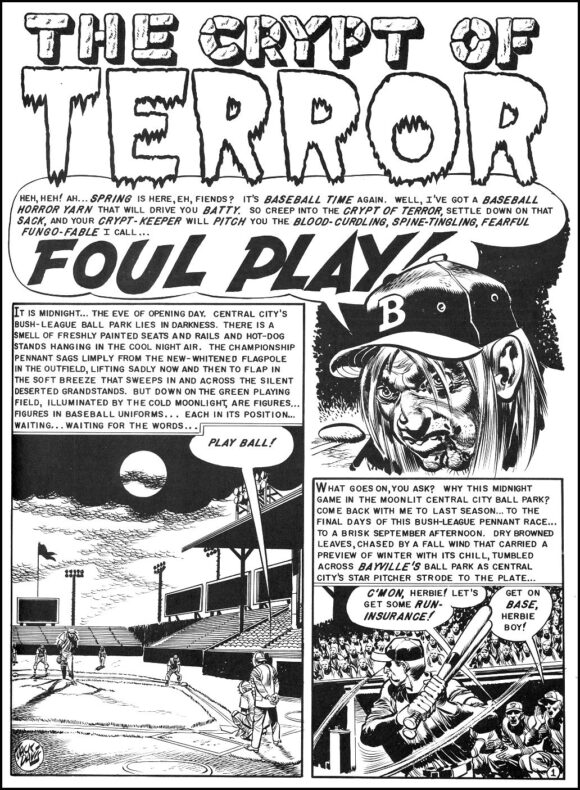
We reach that “twist” ending through the dubious story of Herbie Satten, minor-league pitcher and piece of shit, who spikes a rival star player with poisoned cleats. Figuring out what Satten’s done, the murdered slugger’s teammates lure the cad back to the ballpark and, rather than just, you know, kill him for revenge, they also (off-panel) chop him up into his component parts and play nine innings with them, as one does. And people say baseball is boring!
Needless to say, the Good Doctor was not amused. Seduction of the Innocent features “Foul Play’s” final panel as its first middle-of-the-book illustration. “A comic-book baseball game,” sneers the accompanying caption.
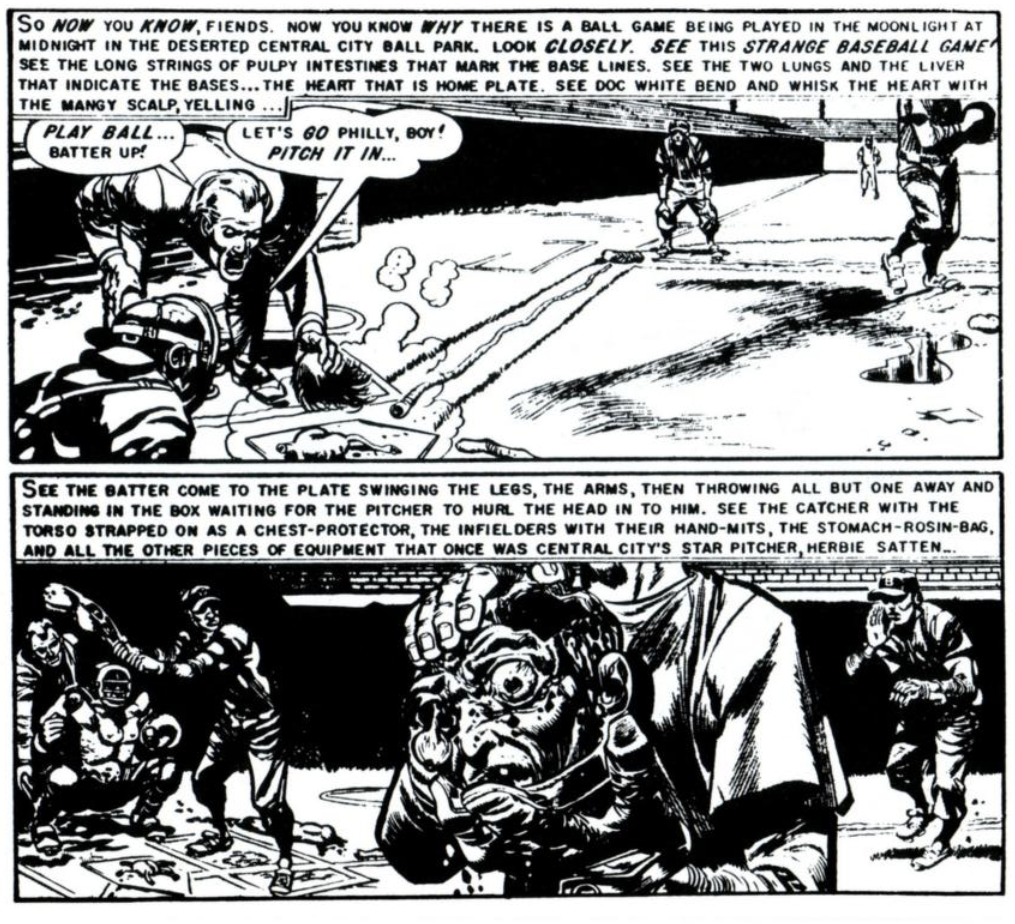
Even King admits, “You may also have an idea of why the comic publishers of America cleaned their own house in the early fifties… before the US Senate decided to do it for them.” Your tax dollars at work!
—
1. Cover, Crime SuspenStories #22. Ultimately, Gaines’ thoughtful attacks on Wertham’s specious arguments during his testimony were ignored in the press. The media instead focused on a ridiculous back-and-forth with Kefauver over exactly how much blood would be acceptable on this Craig cover:
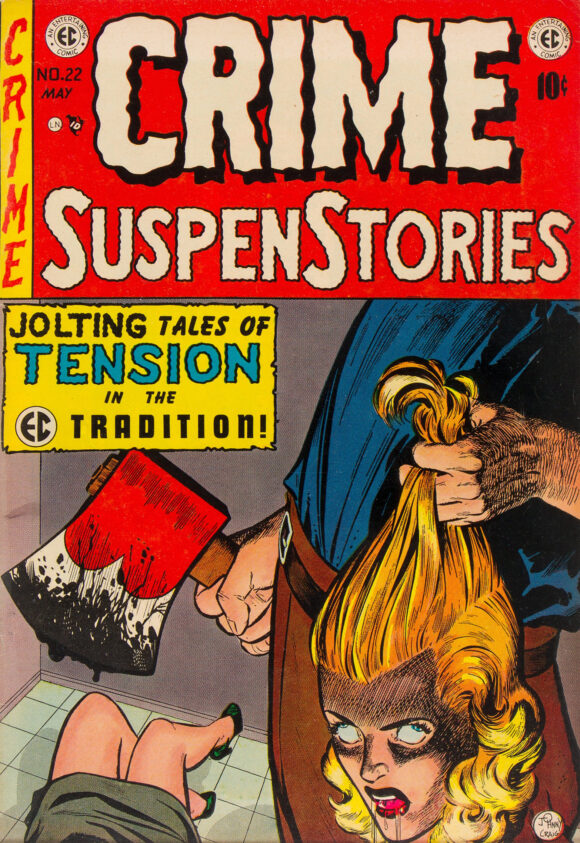
Senator KEFAUVER. Here is your May 22 issue. This seems to be a man with a bloody ax holding a woman’s head up which has been severed from her body. Do you think that is in good taste?
Mr. GAINES. Yes, sir; I do, for the cover of a horror comic. A cover in bad taste, for example, might be defined as holding the head a little higher so that the neck could be seen dripping blood from it and moving the body over a little further so that the neck of the body could be seen to be bloody.
Senator KEFAUVER. You have blood coming out of her mouth.
Mr. GAINES. A little.
Senator KEFAUVER. Here is blood on the ax. I think most adults are shocked by that.
—
“NO HARM IN HORROR, COMICS ISSUER SAYS” was the The New York Times front-page headline about the hearing. Again, few even now would defend such a position.
That said, there’s no doubt that Gaines won and Wertham lost the long game. In the end, the government didn’t need to censor comics—DC, Archie, and the other kids’ publishers were happy to bend over and do that for them: Your tax dollars not at work!
Wertham despised the Comics Code the industry imposed on itself, believing, not without reason, that it harmed children even more by obscuring the consequences of violence. And Gaines, even though he had to trash his horror and crime titles, took Mad from the comics racks to the newsstands and died a beloved industry icon.
Living well is the best revenge!
—
MORE
— EXCLUSIVE: STEPHEN KING Talks BATMAN, EC COMICS. Click here.
— 13 Insane Splash Pages from HAUNTED HORROR: THE SCREAMING SKULLS. Click here.
—
13th Dimension contributor Fred Van Lente is an award-winning, New York Times-bestselling comics writer, as well as an occasional novelist, teacher, and playwright. Sign up for updates on his upcoming projects and check out the trailer for his comics-writing course at his web site, fredvanlente.com.
